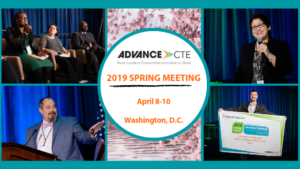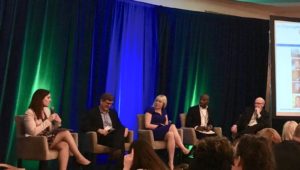This year’s Spring Meeting covered an array of exciting topics. Advance CTE staff reflects on the meeting in this three-part blog series.
This year’s 2019 Spring Meeting was our largest meeting ever. We wish to thank each and every attendee and  sponsor for bringing your wonderful energy and insight to make this year’s meeting one of the most memorable I’ve had in my time with Advance CTE.
sponsor for bringing your wonderful energy and insight to make this year’s meeting one of the most memorable I’ve had in my time with Advance CTE.
Nearly 300 national, state and local CTE leaders joined us April 8-9 at the Omni Shoreham Hotel in Washington, DC. Our attendees traveled from 47 states, the District of Columbia, and the U.S. Virgin Islands, and represented every aspect of CTE including secondary, postsecondary, workforce development, adult education and even the philanthropic community and other key partners.
I also would like to thank and recognize our sponsors, whose partnership and support helped make our meeting a success:
Diamond Level
Kuder, CompTIA, Microsoft Imagine Academy
Platinum Level
CEV Multimedia, Certiport, Fleck Education, NOCTI, NCCER, Oracle Academy, Project Lead the Way, YouScience
Gold Level
ACT, Chmura Economics & Analytics, eScholar, Lincoln Electric, Siemens, Southern Regional Education Board
Silver Level
Manufacturing Skills Standards Council
Bronze Level
CareerSafe, Career Solutions Publishing, CORD, MBA Research, National Council for Health Science Education, NC3T, Precision Exams, The Get A Job Kit, Vivayic
Have you become a member of Advance CTE yet? Today is the perfect day to join us! Member benefits include discounted meeting registration, which you can use at our next in-person meeting.
We hope to see all of you in spring 2020 for our next public meeting. We’ll be announcing our date and location very soon!
Andrea Zimmermann, Senior Associate, Member Engagement and Leadership Development
Philanthropy and Student Leaders Discuss Importance of CTE
Advance CTE’s Spring meeting was full of amazing panels featuring passionate individuals committed to career readiness and Career Technical Education (CTE). One panel – Bold Priorities: The Philanthropic Role in Advancing Quality in CTE – featured leaders from four national philanthropic organizations that have all invested in efforts to ensure more learners are prepared for success in the careers of their choice.
The funders’ had a lot in common when it came to their priorities – closing both access and success equity gaps so  every learner can benefit from CTE pathways and programs; strengthening our data and measures so stakeholders can make more informed decisions about credentials, work-based learning and overall investments; and ensuring strong implementation by better connecting state policy with on-the-ground work. JPMorgan Chase – through Skills at Work and the related New Skills for Work – is supporting states and communities across the world to close the skills gaps and prepare learners for the future of work. The Joyce Foundation is building models of regional innovation and implementation of career pathways systems in the Great Lakes states (more to come on that soon!) and will be supporting Perkins V in the future. The Bill & Melinda Gates Foundation has identified pathways as a central focus of their new strategy, including support for Perkins V implementation over the coming years. And Lumina Foundation is evolving their work around credentials attainment to identify new models of postsecondary access and success. It was so heartening to share the stage with our philanthropic partners who are supporting such amazing work across the country!
every learner can benefit from CTE pathways and programs; strengthening our data and measures so stakeholders can make more informed decisions about credentials, work-based learning and overall investments; and ensuring strong implementation by better connecting state policy with on-the-ground work. JPMorgan Chase – through Skills at Work and the related New Skills for Work – is supporting states and communities across the world to close the skills gaps and prepare learners for the future of work. The Joyce Foundation is building models of regional innovation and implementation of career pathways systems in the Great Lakes states (more to come on that soon!) and will be supporting Perkins V in the future. The Bill & Melinda Gates Foundation has identified pathways as a central focus of their new strategy, including support for Perkins V implementation over the coming years. And Lumina Foundation is evolving their work around credentials attainment to identify new models of postsecondary access and success. It was so heartening to share the stage with our philanthropic partners who are supporting such amazing work across the country!
Later on Tuesday afternoon, we had a particular treat – a panel of secondary, postsecondary and adult CTE learners who shared their stories of how CTE impacted their lives. These students are examples of the best and brightest of CTE. They were incredible advocates for how CTE helped them build professional skills and networks, find their passions and set a clear path for their future. Fritza Camille, for example, a learner at the University of District of Columbia, shared how CTE has changed her life and given her opportunities she couldn’t have imagined when she left college without a degree years before. Ryleigh Travers, who attends one of Virginia’s high-achieving Governors’ Academies and taught us all about the in’s and out’s of livestock judging, talked about how she has had academic, workplace and leadership experiences through CTE that set her apart from her peers.
Zackery Love, a current student at George Washington University, got his first job in the health industry because of credentials he obtained in high school as a CTE student. He shared how, as his high school’s valedictorian and a pre-med college student, he wants to push others to rethink the outdated stigma against CTE. Tony Peeler, Jr., a future student at George Washington University, has already been able to foster his passion for the law throughout high school by spending time at law firms and in the courtroom. Tony and Ryleigh both aspire to political office in the future, Zack is working to be a doctor and Fritza will be rising through the hospitality industry. These students were so incredibly impressive and inspiring and are well on their way to achieving their dreams.
Kate Kreamer, Deputy Executive Director
Measuring and Achieving Bold Results
Whenever possible, we like to use the spring or fall meetings to give State CTE Directors and Advance CTE members a preview of upcoming research. The timing for this year’s meeting just happened to align with the release of the 2019 State of Career Technical Education report – which is based on a national survey focused on the quality and effective use of career readiness data – and so Wednesday’s programming was dedicated to the theme of “Bold Results.”
 The day started with a panel of national data quality experts, who unpacked the report’s major findings and called participants to action. Elizabeth Dabney, from the Data Quality Campaign, urged state leaders to use data as a bridge builder to break down silos across the secondary, postsecondary and workforce sectors. Ryan Ryena, from Education Strategy Group, echoed this idea and pushed states to go further and leverage their collective power to make bold improvements in the quality of their data. Bringing in the workforce perspective, Bryan Wilson from the Workforce Data Quality Campaign – a project of the National Skills Coalition – highlighted opportunities to align accountability and data collection between CTE and the Workforce Innovation and Opportunity Act (WIOA).
The day started with a panel of national data quality experts, who unpacked the report’s major findings and called participants to action. Elizabeth Dabney, from the Data Quality Campaign, urged state leaders to use data as a bridge builder to break down silos across the secondary, postsecondary and workforce sectors. Ryan Ryena, from Education Strategy Group, echoed this idea and pushed states to go further and leverage their collective power to make bold improvements in the quality of their data. Bringing in the workforce perspective, Bryan Wilson from the Workforce Data Quality Campaign – a project of the National Skills Coalition – highlighted opportunities to align accountability and data collection between CTE and the Workforce Innovation and Opportunity Act (WIOA).
After an engaging discussion on the power of high-quality data, panelists broke out to lead a series of breakout sessions on data quality and effectiveness, including topics such as aligning cross-sector data systems or measuring a “high-quality” program. The full State of CTE report will be available on April 18 in the Learning that Works Resource Center.
Austin Estes, Senior Policy Associate

